Gone_with_the_wind乱世佳人介绍赏析
- 格式:ppt
- 大小:5.19 MB
- 文档页数:32
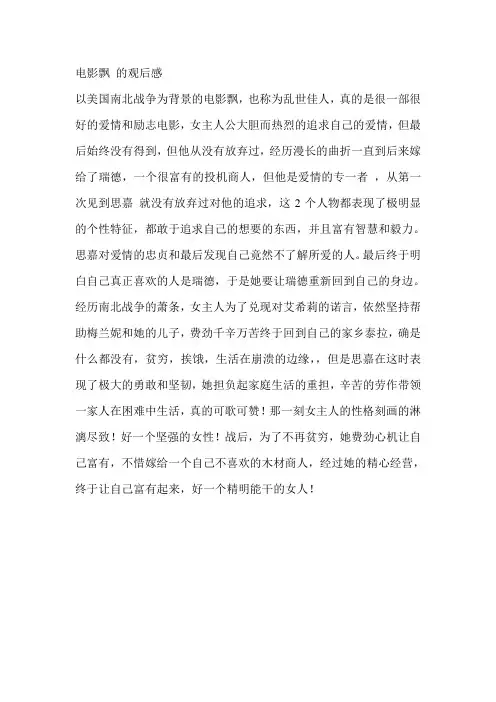
电影飘的观后感
以美国南北战争为背景的电影飘,也称为乱世佳人,真的是很一部很好的爱情和励志电影,女主人公大胆而热烈的追求自己的爱情,但最后始终没有得到,但他从没有放弃过,经历漫长的曲折一直到后来嫁给了瑞德,一个很富有的投机商人,但他是爱情的专一者,从第一次见到思嘉就没有放弃过对他的追求,这2个人物都表现了极明显的个性特征,都敢于追求自己的想要的东西,并且富有智慧和毅力。
思嘉对爱情的忠贞和最后发现自己竟然不了解所爱的人。
最后终于明白自己真正喜欢的人是瑞德,于是她要让瑞德重新回到自己的身边。
经历南北战争的萧条,女主人为了兑现对艾希莉的诺言,依然坚持帮助梅兰妮和她的儿子,费劲千辛万苦终于回到自己的家乡泰拉,确是什么都没有,贫穷,挨饿,生活在崩溃的边缘,,但是思嘉在这时表现了极大的勇敢和坚韧,她担负起家庭生活的重担,辛苦的劳作带领一家人在困难中生活,真的可歌可赞!那一刻女主人的性格刻画的淋漓尽致!好一个坚强的女性!战后,为了不再贫穷,她费劲心机让自己富有,不惜嫁给一个自己不喜欢的木材商人,经过她的精心经营,终于让自己富有起来,好一个精明能干的女人!。
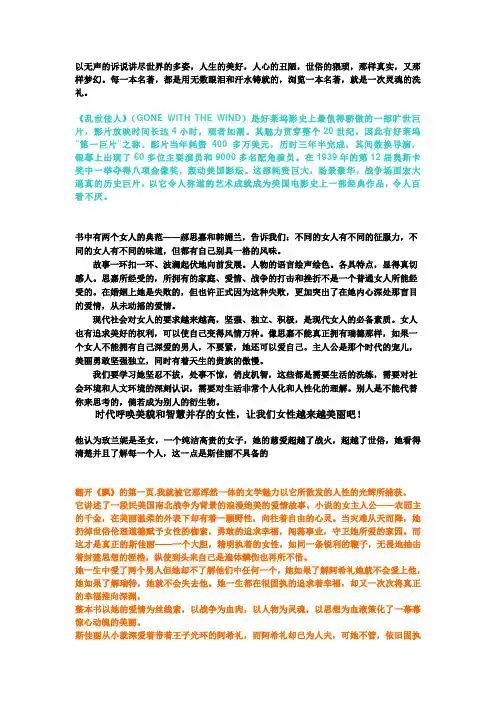
以无声的诉说讲尽世界的多姿,人生的美好,人心的丑陋,世俗的猥琐,那样真实,又那样梦幻。
每一本名著,都是用无数眼泪和汗水铸就的,浏览一本名著,就是一次灵魂的洗礼。
《乱世佳人》(GONE WITH THE WIND)是好莱坞影史上最值得骄傲的一部旷世巨片,影片放映时间长达4小时,观者如潮。
其魅力贯穿整个20世纪,因此有好莱坞“第一巨片”之称。
影片当年耗资400多万美元,历时三年半完成,其间数换导演,银幕上出现了60多位主要演员和9000多名配角演员。
在1939年的第12届奥斯卡奖中一举夺得八项金像奖,轰动美国影坛。
这部耗资巨大,场景豪华,战争场面宏大逼真的历史巨片,以它令人称道的艺术成就成为美国电影史上一部经典作品,令人百看不厌。
书中有两个女人的典范——郝思嘉和韩媚兰,告诉我们:不同的女人有不同的征服力,不同的女人有不同的味道,但都有自己别具一格的风味。
故事一环扣一环、波澜起伏地向前发展。
人物的语言绘声绘色。
各具特点,显得真切感人。
思嘉所经受的,所拥有的家庭、爱情、战争的打击和挫折不是一个普通女人所能经受的。
在婚姻上她是失败的,但也许正式因为这种失败,更加突出了在她内心深处那盲目的爱情,从未动摇的爱情。
现代社会对女人的要求越来越高,坚强、独立、积极,是现代女人的必备素质。
女人也有追求美好的权利,可以使自己变得风情万种。
像思嘉不能真正拥有瑞德那样,如果一个女人不能拥有自己深爱的男人,不要紧,她还可以爱自己。
主人公是那个时代的宠儿,美丽勇敢坚强独立,同时有着天生的贵族的傲慢。
我们要学习她坚忍不拔,处事不惊,俏皮机智,这些都是需要生活的洗练,需要对社会环境和人文环境的深刻认识,需要对生活非常个人化和人性化的理解。
别人是不能代替你来思考的,倘若成为别人的衍生物。
时代呼唤美貌和智慧并存的女性,让我们女性越来越美丽吧!他认为玫兰妮是圣女,一个纯洁高贵的女子,她的慈爱超越了战火,超越了世俗,她看得清楚并且了解每一个人,这一点是斯佳丽不具备的翻开《飘》的第一页,我就被它那浑然一体的文学魅力以它所散发的人性的光辉所捕获。
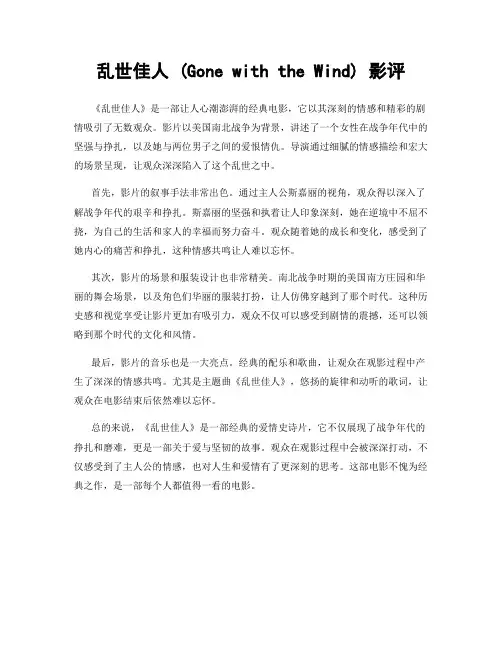
乱世佳人 (Gone with the Wind) 影评
《乱世佳人》是一部让人心潮澎湃的经典电影,它以其深刻的情感和精彩的剧情吸引了无数观众。
影片以美国南北战争为背景,讲述了一个女性在战争年代中的坚强与挣扎,以及她与两位男子之间的爱恨情仇。
导演通过细腻的情感描绘和宏大的场景呈现,让观众深深陷入了这个乱世之中。
首先,影片的叙事手法非常出色。
通过主人公斯嘉丽的视角,观众得以深入了解战争年代的艰辛和挣扎。
斯嘉丽的坚强和执着让人印象深刻,她在逆境中不屈不挠,为自己的生活和家人的幸福而努力奋斗。
观众随着她的成长和变化,感受到了她内心的痛苦和挣扎,这种情感共鸣让人难以忘怀。
其次,影片的场景和服装设计也非常精美。
南北战争时期的美国南方庄园和华丽的舞会场景,以及角色们华丽的服装打扮,让人仿佛穿越到了那个时代。
这种历史感和视觉享受让影片更加有吸引力,观众不仅可以感受到剧情的震撼,还可以领略到那个时代的文化和风情。
最后,影片的音乐也是一大亮点。
经典的配乐和歌曲,让观众在观影过程中产生了深深的情感共鸣。
尤其是主题曲《乱世佳人》,悠扬的旋律和动听的歌词,让观众在电影结束后依然难以忘怀。
总的来说,《乱世佳人》是一部经典的爱情史诗片,它不仅展现了战争年代的挣扎和磨难,更是一部关于爱与坚韧的故事。
观众在观影过程中会被深深打动,不仅感受到了主人公的情感,也对人生和爱情有了更深刻的思考。
这部电影不愧为经典之作,是一部每个人都值得一看的电影。
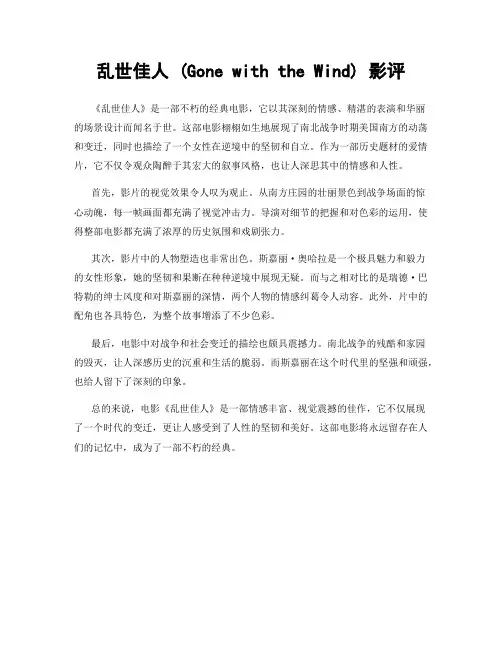
乱世佳人 (Gone with the Wind) 影评
《乱世佳人》是一部不朽的经典电影,它以其深刻的情感、精湛的表演和华丽
的场景设计而闻名于世。
这部电影栩栩如生地展现了南北战争时期美国南方的动荡和变迁,同时也描绘了一个女性在逆境中的坚韧和自立。
作为一部历史题材的爱情片,它不仅令观众陶醉于其宏大的叙事风格,也让人深思其中的情感和人性。
首先,影片的视觉效果令人叹为观止。
从南方庄园的壮丽景色到战争场面的惊
心动魄,每一帧画面都充满了视觉冲击力。
导演对细节的把握和对色彩的运用,使得整部电影都充满了浓厚的历史氛围和戏剧张力。
其次,影片中的人物塑造也非常出色。
斯嘉丽·奥哈拉是一个极具魅力和毅力
的女性形象,她的坚韧和果断在种种逆境中展现无疑。
而与之相对比的是瑞德·巴特勒的绅士风度和对斯嘉丽的深情,两个人物的情感纠葛令人动容。
此外,片中的配角也各具特色,为整个故事增添了不少色彩。
最后,电影中对战争和社会变迁的描绘也颇具震撼力。
南北战争的残酷和家园
的毁灭,让人深感历史的沉重和生活的脆弱。
而斯嘉丽在这个时代里的坚强和顽强,也给人留下了深刻的印象。
总的来说,电影《乱世佳人》是一部情感丰富、视觉震撼的佳作,它不仅展现
了一个时代的变迁,更让人感受到了人性的坚韧和美好。
这部电影将永远留存在人们的记忆中,成为了一部不朽的经典。
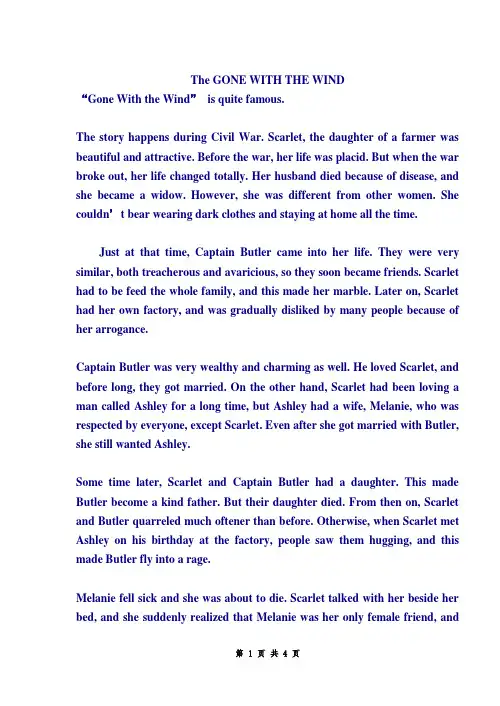
The GONE WITH THE WIND“Gone With the Wind”is quite famous.The story happens during Civil War. Scarlet, the daughter of a farmer was beautiful and attractive. Before the war, her life was placid. But when the war broke out, her life changed totally. Her husband died because of disease, and she became a widow. However, she was different from other women. She couldn’t bear wearing dark clothes and staying at home all the time.Just at that time, Captain Butler came into her life. They were very similar, both treacherous and avaricious, so they soon became friends. Scarlet had to be feed the whole family, and this made her marble. Later on, Scarlet had her own factory, and was gradually disliked by many people because of her arrogance.Captain Butler was very wealthy and charming as well. He loved Scarlet, and before long, they got married. On the other hand, Scarlet had been loving a man called Ashley for a long time, but Ashley had a wife, Melanie, who was respected by everyone, except Scarlet. Even after she got married with Butler, she still wanted Ashley.Some time later, Scarlet and Captain Butler had a daughter. This made Butler become a kind father. But their daughter died. From then on, Scarlet and Butler quarreled much oftener than before. Otherwise, when Scarlet met Ashley on his birthday at the factory, people saw them hugging, and this made Butler fly into a rage.Melanie fell sick and she was about to die. Scarlet talked with her beside her bed, and she suddenly realized that Melanie was her only female friend, andshe loved her very much. She also realized she didn’t really love Ashley. But everything was too late.When Scarlet hurried home to tell Captain Butler, she is really love him, Captain Butler no longer believe her. He decided to leave Scarlet, returned home to find the good things, abandoned Scarlet stood foggy in the hospital, the thought of my father once said a word to her: "the world's only land and tomorrow." She decided to keep on her land to create a new life, and she is looking forward to the arrival of a bright future.The GONE WITH THE WIND take the heroine Scarlett's love entanglement and the life bitter experience as the master line, vividly reappeared south the plantation economy from as the collapse, the slave-owner has as prosperously lived from as luxuriously as the dead end, the slave-owner social class by crazily provokes the war until the defeat death, the slavery economy substitutes for south this US for the capitalism economy slave society's collapse history. Therefore, it is not only a human happy love pinnacle of poetic creation, also was a reflection politics, the economy, moral many aspects is huge at that time the historical picture scroll which but profoundly changed.I think the film attracted me to three points.1. lifeWar and poverty make her stronger, and let her become a family of little girls from a day of love. "We had a storm, storm is coming, we believe that the inevitable, do not complain, just work, smiling, waiting for our time." This is the suffering of the war Mrs. Fang appreciation for Scarlett. Indeed, life is like a big mountain, the mountain road can not be completely flat. When suffering setbacks, the most important is how to solve and make up for the past, all the past, whether it is beautiful or painful, it is only in the past, it isnow and in the future. Difficulty is not terrible, but the most terrible for us after suffering is unable to get up after a fall. In addition to life, everything can be repeated. All external punishment can not change the trajectory of life, loss of confidence and courage is the biggest loss.We are now living in a relatively peaceful and open era, and we don't have to worry about the livelihood of the living, we don't have to worry about the war, but, in our life, there is no ups and downs and ups and downs. We may still be in the exam for a failure and the right, will be for the cause of the ups and downs of pain, we do not go around the twists and turns, we should think of Scarlett, brave to face them, rather than retreat, give up. Most of the time, the destiny is always in with us, our team is crying, it will only make us more painful, we smile to it, it will bring us hope, since so, why not let go can not change the past, grasp a belong to tomorrow? After all, many of the pain and failure is only yesterday, yesterday only to their own, only to change their fate, each day is a new beginning, nothing can stop our efforts and struggle. Whether Scarlett's path is correct before the pain she never give up spirit, in the face of difficulties of life attitude is worth learning.2.loveDeep love Reed Scarlett not only gave her enough material life, also gave her the deepest love. But life is not very perfect, because people are not perfect, in particular, is given by the people in general will not be aware of the good people around. Reed year old love her more than anything, but because of some illegal business and Scarlett to prevent. And Scarlett believes that Reed and his heart of the white horse prince of the image difference is too far. So they go together just because of the interests of the relationship. Plus Scarlett is stubborn and strong self-esteem, she is afraid of rejection also afraid of disappointment, so she and Reed love striking one snag after another. The two sides also tortured physical and mental fatigue. It is no doubt that Scarlett and Reed together in the days of happiness and hateful. Then Scarlettsuffered the death of her daughter and her husband. Reed was so in love with Scarlett so much that he moved all his love to his daughter, and when his daughter died, he was reluctant to bury her with her own daughter. He said to Scarlett, "Scarlett, I've never had the patience to pick up the broken pieces and say," this is not good, it's always broken, and I'd rather remember that it's broken than it was before."The beautiful dream is unreal, want to get the nothingness of love is fleeting, life in this nothing to rely on his fantasies seem strong and alive, disguise the best。
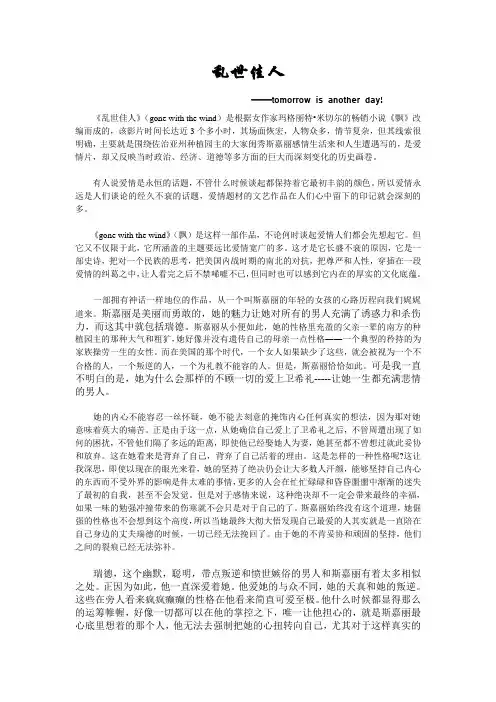
乱世佳人——tomorrow is another day!《乱世佳人》(gone with the wind)是根据女作家玛格丽特•米切尔的畅销小说《飘》改编而成的,该影片时间长达近3个多小时,其场面恢宏,人物众多,情节复杂,但其线索很明确,主要就是围绕佐治亚州种植园主的大家闺秀斯嘉丽感情生活来和人生遭遇写的,是爱情片,却又反映当时政治、经济、道德等多方面的巨大而深刻变化的历史画卷。
有人说爱情是永恒的话题,不管什么时候谈起都保持着它最初丰韵的颜色。
所以爱情永远是人们谈论的经久不衰的话题,爱情题材的文艺作品在人们心中留下的印记就会深刻的多。
《gone with the wind》(飘)是这样一部作品,不论何时谈起爱情人们都会先想起它。
但它又不仅限于此,它所涵盖的主题要远比爱情宽广的多。
这才是它长盛不衰的原因,它是一部史诗,把对一个民族的思考,把美国内战时期的南北的对抗,把尊严和人性,穿插在一段爱情的纠葛之中,让人看完之后不禁唏嘘不已,但同时也可以感到它内在的厚实的文化底蕴。
一部拥有神话一样地位的作品,从一个叫斯嘉丽的年轻的女孩的心路历程向我们娓娓道来。
斯嘉丽是美丽而勇敢的,她的魅力让她对所有的男人充满了诱惑力和杀伤力,而这其中就包括瑞德。
斯嘉丽从小便如此,她的性格里充盈的父亲一辈的南方的种植园主的那种大气和粗犷,她好像并没有遗传自己的母亲一点性格――一个典型的矜持的为家族操劳一生的女性。
而在美国的那个时代,一个女人如果缺少了这些,就会被视为一个不合格的人,一个叛逆的人,一个为礼教不能容的人。
但是,斯嘉丽恰恰如此。
可是我一直不明白的是,她为什么会那样的不顾一切的爱上卫希礼-----让她一生都充满悲情的男人。
她的内心不能容忍一丝怀疑,她不能去刻意的掩饰内心任何真实的想法,因为那对她意味着莫大的痛苦。
正是由于这一点,从她确信自己爱上了卫希礼之后,不管周遭出现了如何的困扰,不管他们隔了多远的距离,即使他已经娶她人为妻,她甚至都不曾想过就此妥协和放弃。
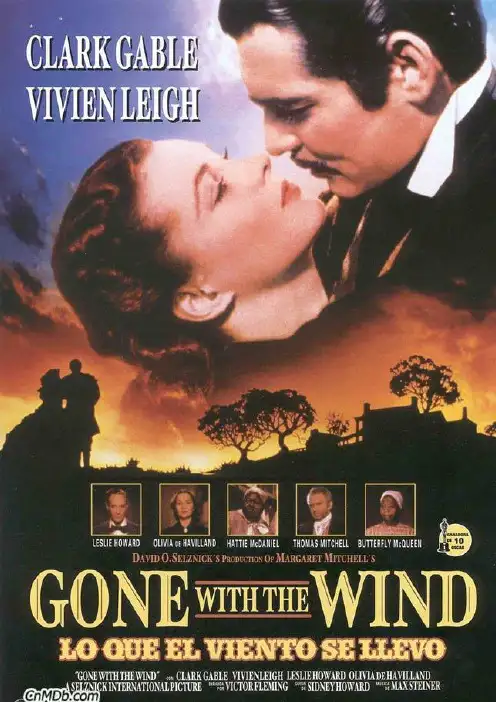
《乱世佳人》一、内容简介类型:爱情,剧情,战争对白语言:英语导演:维克多费莱明主演:克拉克盖博,费雯丽制片地区:美国色彩:彩色片长:238min 其他译名:飘中文名:乱世佳人外文名:Gone with the Wind本片根据美国女作家玛格丽特-米契尔的长篇畅销小说《飘》改编而成。
影片以美国南北战争为背景,描写了南方两个庄园的兴衰历程以及几个人物之间的爱情波折。
美丽任性的庄园主之女郝思嘉小姐,高傲自信、青春夺人。
在一次酒会上赢得了青年浪子白瑞德的青睐。
而郝思嘉的心却为另一位庄园公子卫希礼所占据,卫与表妹媚兰情意相投,已结连理。
战争的爆发使郝思嘉二度成为寡妇并最终与白瑞德结合,但对卫希礼的爱之梦却依然没有破灭,直至唯一爱女骑马身亡,白瑞德在绝望中离她而去,这位美国南方姑娘在历经战争和生活磨难后,才终于明白了自己的真正所爱。
二、主题《乱世佳人》的成功,首先在于制片人选择了一个良好的制作脚本。
作者以她的家乡为故事背景,以同情黑奴的南方农奴主观点描述南北战争期间一个南方家族的兴衰经历。
尤其是以一种伤感的情调,真实的描写出南方奴隶主文明在北方资本主义文明面前的一败涂地的史实,因而具有了很高的文学鉴赏价值和艺术史诗品位。
片中还很好的表现了“美国精神”,斯嘉丽的形象就很好的表现了奋发向上的“美国精神”。
三、结构影片严格按照传统的戏剧式结构,以斯嘉丽和几个男人的纠葛和她的几次婚姻变化为叙事主体,从人物与社会环境的冲突中体现出人性的扭曲和个性的变异,从而揭示女主人公的悲剧根源。
影片在情节发展上十分注重各种戏剧性矛盾的展示和戏剧性情境的营造:战争中南北双方的矛盾、南方内部人与人之间的矛盾、爱情纠葛的矛盾及人与社会环境的矛盾等等。
在人物形象塑造上,影片的编导注重把几个不同的艺术个性加以对比,从而突出主人公的性格特征。
片中几位主要人物性格迥异:郝思嘉热情奔放、倔强任性、泼辣大胆、敢爱敢恨;白瑞德正义勇敢、玩世不恭、豪放磊落、幽默风趣;卫希礼冷静理智、宽容大度、文质彬彬和梅兰妮的温柔贤淑、心地善良等。

横亘古今的爱情-《gone with the wind》国际商学部国际经济与贸易毕晓旭1220020002周一晚十二、十三节《gone with the wind》直译为“随风逝去”,但我更喜欢它的另一个翻译,《乱世佳人》。
郝思嘉出生在美国的种植园家庭,本应该过的无忧无虑,一生平平淡淡,但是性格决定命运,她的性格注定她不会有平淡的一生。
郝思嘉的人格是一种典型人格, 现代生活中广泛存在的“郝思嘉情结”。
她是父亲的宠女,在妈妈那里又依顺乖觉,惟独对两个妹妹独裁专制,这造成了她在家庭中相当独特的位置;在这个位置上她渐渐成长着占有性很强、嫉妒性很强且又任性跋扈的人格。
一方面,她受不了母亲责备的目光,所以,她在母亲面前总是摆出最好的面孔,行动也最规矩;另一方面,她似乎每日在学习礼貌,但骨子里却什么也没有学到,她在与父亲相互默契的配合中,抵抗着来自母亲的道德统治。
母亲的温言软语,加上家中奶妈的唠叨,完整地构成了传统道德秩序的统治;为了对抗这个统治,她表现出强烈的叛逆。
同样,她又是绝对的自我中心主义。
就像小说一开始描写得那样,任何一个人数众多的时间不以她为谈话中心,她就忍受不了。
这种对同性的绝对排斥与自我中心主义结合在一起的极端表现,就是只要一个男人爱别的女人而不爱她,她就无法忍受。
为了平复这种强烈的刺激,她会做出超越常规的事情。
她会和任何一个女人争夺男人。
她在一切相恋的男女之间毫无顾忌地插足。
她不是因为爱某个男人而勾引他,而是为了战胜某个女人而勾引男人。
因为所有的女人都是她的敌人。
好多人讨厌郝思嘉,因为她吝啬,狡诈,自私,拜金,剥削他人的劳动,可是要知道我们任何人都不是完人,不要用她的缺点掩盖住她的优点。
她张扬放肆,敢爱敢恨,她的的坚强,勇敢,独立,那股子不服输的韧劲儿是我所羡慕的,也是我所追求的。
我认为至少郝思嘉活的真实,不用带着面具活着,爱就爱,恨就恨,没有模棱两可,没有将将就就。
当上帝创造女人时,女人就作为男人身上的肋骨处于附属地位,女性在各个领域低于男性似乎就变得合理化了。
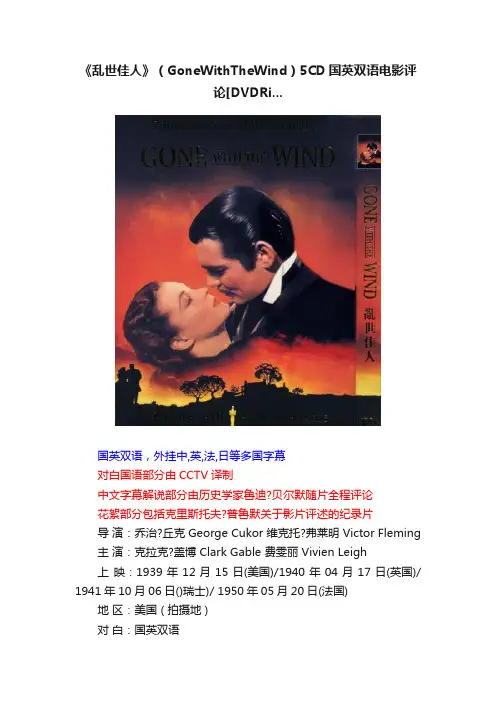
《乱世佳人》(GoneWithTheWind)5CD国英双语电影评论[DVDRi...国英双语,外挂中,英,法,日等多国字幕对白国语部分由CCTV译制中文字幕解说部分由历史学家鲁迪?贝尔默随片全程评论花絮部分包括克里斯托夫?普鲁默关于影片评述的纪录片导演:乔治?丘克 George Cukor 维克托?弗莱明 Victor Fleming 主演:克拉克?盖博 Clark Gable 费雯丽 Vivien Leigh上映:1939年12月15日(美国)/1940年04月17日(英国)/ 1941年10月06日()瑞士)/ 1950年05月20日(法国)地区:美国 ( 拍摄地 )对白:国英双语评分:8.1/10( 31416票 )颜色:彩色声音:Dolby Digital AC3时长:225分钟类型:剧情爱情战争分级:瑞典:15 美国:Approved 澳大利亚:PG 英国:PG 美国:G 德国:12 智利:TE 芬兰:K-16字幕:韩/英/法/西/日/中/泰/印/中文解说/日文解说/韩文解说剧情简介:影片以美国南北战争为背景,描写了南方两个庄园的兴衰历程以及几个人物之间的爱情波折。
美丽任性的庄园主之女郝思嘉小姐,高傲自信,青春夺人.在一次酒会上赢得了青年浪子白瑞德的青睐.而郝思嘉的心却为另一位庄园公子艾希利所占据, 艾希利与表妹媚兰情投意合,已结连理。
战争的爆发使郝思嘉两度成为寡妇并最终与白瑞德结合,但对艾希利的爱之梦却依然没有破灭.直到唯一爱女坠马身亡, 白瑞德在绝望中离她而去,这位美国南方姑娘在经历战争和生活的磨难后,才终于明白了自己的真正所爱… …Scarlett is a woman who can deal with a nation at war, Atlanta burning ,the Union Army carrying off everything from her beloved Tara, the carpetbaggers who arrive after the war. Scarlett is beautiful. She has vitality. But Ashley, the man she has wanted for so long, is going to marry his placid cousin, Melanie. Mammy warns Scarlett to behave herself at the party at Twelve Oaks. There is a new man there that day, the day the Civil War begins. Rhett Butler. Scarlett does not know he is in the room when she pleads with Ashley to choose her instead of Melanie.获奖情况:1939年美国影艺最佳影片、最佳导演、最佳女演员、最佳女配角、最佳编剧、最佳摄影、最佳美工、最佳剪辑八项奥斯卡金像奖美国影艺学院彩色摄影特别奖以及纽约影评协会最佳女演员奖一九七七年美国电影学会评选的“美国十大佳片“之一美国百部经典名片之一演员表:费?雯丽 Vivien Leigh .... Scarlett O'Hara克拉克?盖博 Clark Gable .... Rhett Butler奥莉薇?德哈佛兰 Olivia de Havilland .... Melanie Hamilton沃德?邦德 Ward Bond .... Tom (Yankee captain)莱斯利?霍华德 Leslie Howard .... Ashley Wilkes威廉?贝克韦尔 William Bakewell .... Mounted officer简?达维尔 Jane Darwell .... Mrs. Dolly MerriwetherGeorge Reeves .... Stuart TarletonHarry Davenport .... Dr. MeadeEric Alden .... Rafe Calvert (uncredited)Eddie 'Rochester' Anderson .... Uncle PeterMary Anderson .... Maybelle MerriwetherJohn Arledge .... Dying soldier (uncredited)Roscoe Ates .... Convalescent soldier (uncredited)Irving Bacon .... Corporal幕后:1936年,玛格丽特?米切尔的畅销小说《飘》问世了。
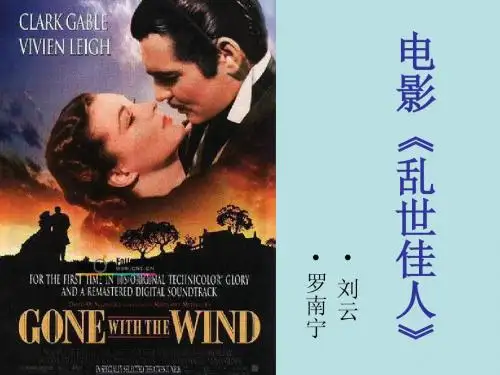
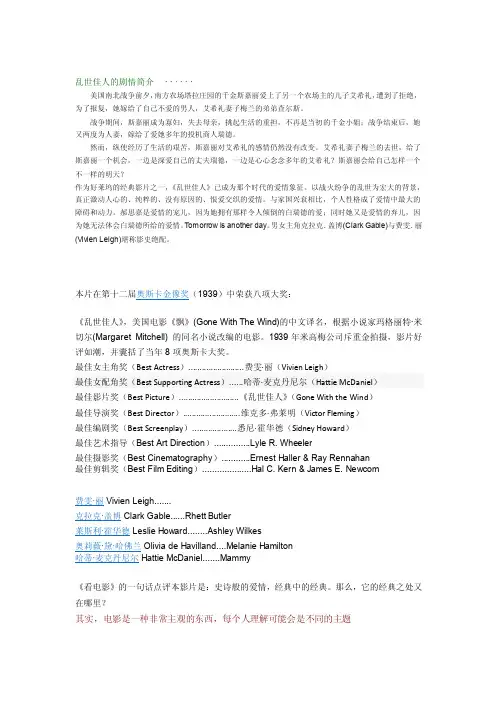
乱世佳人的剧情简介· · · · · ·美国南北战争前夕,南方农场塔拉庄园的千金斯嘉丽爱上了另一个农场主的儿子艾希礼,遭到了拒绝,为了报复,她嫁给了自己不爱的男人,艾希礼妻子梅兰的弟弟查尔斯。
战争期间,斯嘉丽成为寡妇,失去母亲,挑起生活的重担,不再是当初的千金小姐;战争结束后,她又两度为人妻,嫁给了爱她多年的投机商人瑞德。
然而,纵使经历了生活的艰苦,斯嘉丽对艾希礼的感情仍然没有改变。
艾希礼妻子梅兰的去世,给了斯嘉丽一个机会,一边是深爱自己的丈夫瑞德,一边是心心念念多年的艾希礼?斯嘉丽会给自己怎样一个不一样的明天?作为好莱坞的经典影片之一,《乱世佳人》已成为那个时代的爱情象征。
以战火纷争的乱世为宏大的背景,真正激动人心的、纯粹的、没有原因的、恨爱交织的爱情。
与家国兴衰相比,个人性格成了爱情中最大的障碍和动力。
郝思嘉是爱情的宠儿,因为她拥有那样令人倾倒的白瑞德的爱;同时她又是爱情的弃儿,因为她无法体会白瑞德所给的爱情。
Tomorrow is another day。
男女主角克拉克.盖博(Clark Gable)与费雯.丽(Vivien Leigh)堪称影史绝配。
本片在第十二届奥斯卡金像奖(1939)中荣获八项大奖:《乱世佳人》,美国电影《飘》(Gone With The Wind)的中文译名,根据小说家玛格丽特·米切尔(Margaret Mitchell) 的同名小说改编的电影。
1939年米高梅公司斥重金拍摄,影片好评如潮,并囊括了当年8项奥斯卡大奖。
最佳女主角奖(Best Actress).........................费雯·丽(Vivien Leigh)最佳女配角奖(Best Supporting Actress)......哈蒂·麦克丹尼尔(Hattie McDaniel)最佳影片奖(Best Picture)...........................《乱世佳人》(Gone With the Wind)最佳导演奖(Best Director)..........................维克多·弗莱明(Victor Fleming)最佳编剧奖(Best Screenplay)....................悉尼·霍华德(Sidney Howard)最佳艺术指导(Best Art Direction)...............Lyle R. Wheeler最佳摄影奖(Best Cinematography)............Ernest Haller & Ray Rennahan最佳剪辑奖(Best Film Editing)....................Hal C. Kern & James E. Newcom费雯·丽 Vivien Leigh.......克拉克·盖博 Clark Gable......Rhett Butler莱斯利·霍华德 Leslie Howard........Ashley Wilkes奥莉薇·黛·哈佛兰 Olivia de Havilland....Melanie Hamilton哈蒂·麦克丹尼尔 Hattie McDaniel.......Mammy《看电影》的一句话点评本影片是:史诗般的爱情,经典中的经典。
ARGARET ITCHELL WAS BORNlawyer and the president of the Atlanta Historical Society, and her mother was a suffragette (a woman in support of extending the right to vote, especially to women) and an advoc ate of women’s rights in general. Mitchell grew up listening to stories about Atlanta during the Civil War, stories often told by people who had lived through the war. Mitchell attended Smith College, a women’s college in Northampton, Massachusetts. In 1919, she returned to Atlanta and began to live a lifestyle considered wild by the standards of the 1920s. After a disastrous first marriage, Mitchell began a career as a journalist and married an advertising executive named John Robert Marsh. In 1926, encouraged by her husband, Mitchell began to write the novel that would become Gone with the Wind. She went through nine complete drafts of the thousand-page work, setting an epic romance against the Civil War background she knew so well. In the first ei ght drafts, the protagonist was called Prissy Hamilton, not Scarlett O’Hara (as the character was renamed in the final draft).Gone with the Wind differs from most Civil War novels by glorifying the South and demonizing the North. Other popular novels about the Civil War, such as Stephen Crane’s The Red Badge of Courage, are told from a Northern perspective and tend to exalt the North’s values. Mitchell’s novel is unique also for its portrayal of a strong-willed, independent woman, Scarlett O’Hara, who shares many characteristics with Mitchell herself. Mitchell frequently defied convention, divorcing her first husband and pursuing a career in journalism despite the disapproval of society.Gone with the Wind was published in 1936, ten years after Mitchell began writing it. A smash success upon publication, Gone with the Wind became—and remains even now—one of the best-selling novels of all time. It received the 1937 Pulitzer Prize. In the late 1930s a film version of the novel was planned, and David O. S elznick’s nationwide search for an actress to play Scarlett O’Hara captivated the nation’s attention. The resulting film starred Vivien Leigh and Clark Gable as Scarlett O’Hara and Rhett Butler, and it quickly became one of the most popular motion pictures of all time.Mitchell was less than thrilled by the sweeping popularity of her work. She found the spotlight uncomfortable and grew exhausted and ill. Gone with the Wind is her only novel, though she continued to write nonfiction. Mitchell volunteered extensively during World War II and seemed to regain her strength. In 1949 a car struck and killed Mitchell while she was crossing Peachtree Street in Atlanta.Many critics question the literary merit and outdated racial stances of Gone with the Wind. Some consider the novel fluffy, partly because women of Mitchell’s time rarely received credit for serious literary fiction and partly because the novel features a romance along with its historical plot. Both blacks and whites have harshly criticized Mitchell’s sympathetic depiction of slavery and the Ku Klux Klan and her racist depiction of blacks. The novel is most valuable ifread with an understanding of three historical contexts: our own, Mitchell’s, and Scarlett’s.Plot OverviewI T IS THE SPRING OF 1861.Scarlett O’Hara, a pretty Southern belle, lives on Tara, a large plantation in Georgia. She concerns herself only with her numerous suitors and her desire to marry Ashley Wilkes. One day she hears that Ashley is engaged to Melanie Hamilton, his frail, plain cousin from Atlanta. At a barbecue at the Wilkes plantation the next day, Scarlett confesses her feelings to Ashley. He tells her that he does love her but that he is marrying Melanie because she is similar to him, whereas he and Scarlett are very different. Scarlett slaps Ashley and he leaves the room. Suddenly Scarlett realizes that she is not alone. Rhett Butler, a scandalous but dashing adventurer, has been watching the whole scene, and he compliments Scarlett on being unladylike.The Civil War begins. Charles Hamilton, Melanie’s timid, dull brother, proposes to Scarlett. She spitefully agrees to marry him, hoping to hurt Ashley. Over the course of two months, Scarlett and Charles marry, Charles joins the army and dies of the measles, and Scarlett learns that she is pregnant. After Scarlett gives birth to a son, Wade, she becomes bored and unhappy. She makes a long trip to Atlanta to stay with Melanie and Melanie’s aun t, Pittypat. The busy city agrees with Scarlett’s temperament, and she begins to see a great deal of Rhett. Rhett infuriates Scarlett with his bluntness and mockery, but he also encourages her to flout the severely restrictive social requirements for mourning Southern widows. As the war progresses, food and clothing run scarce in Atlanta. Scarlett and Melanie fear for Ashley’s safety. After the bloody battle of Gettysburg, Ashley is captured and sent to prison, and the Yankee army begins bearing down on Atlanta. Scarlett desperately wants to return home to Tara, but she has promised Ashley she will stay with the pregnant Melanie, who could give birth at any time.On the night the Yankees capture Atlanta and set it afire, Melanie gives birth to her son, Beau. Rhett helps Scarlett and Melanie escape the Yankees, escorting them through the burning streets of the city, but he abandons them outside Atlanta so he can join the Confederate Army. Scarlett drives the cart all night and day through a dangerous forest full of deserters and soldiers, at last reaching Tara. She arrives to find that her mother, Ellen, is dead; her father, Gerald, has lost his mind; and the Yankee army has looted the plantation, leaving no food or cotton. Scavenging for subsistence, a furious Scarlett vows never to go hungry again.Scarlett takes charge of rebuilding Tara. She murders a Yankee thief and puts out a fire set by a spiteful Yankee soldier. At last the war ends, word comes that Ashley is free and on his way home, and a stream of returning soldiers begins pouring through Tara. One such soldier, a one-legged homeless Confederate named Will Benteen, stays on and helps Scarlett with the plantation. One day, Will brings terrible news: Jonas Wilkerson, a former employee at Tara and current government official, has raised the taxes on Tara, hoping to drive theO’Haras out so that he mig ht buy the plantation. Distraught, Scarlett hurries toAtlanta to seduce Rhett Butler so that he will give her the three hundred dollars she needs for taxes. Rhett has emerged from the war a fabulously wealthy man, dripping with earnings from his blockade-running operation and from food speculation. However, Rhett is in a Yankee jail and cannot help Scarlett. Scarlett sees her sister’s beau, Frank Kennedy, who now owns a general store, and forges a plan. Determined to save Tara, she betrays her sister and marries Frank, pays the taxes on Tara, and devotes herself to making Frank’s business more profitable.After Rhett blackmails his way out of prison, he lends Scarlett enough moneyto buy a sawmill. To the displeasure of Atlanta society, Scarlett becomes a shrewd businesswoman. Gerald dies, and Scarlett returns to Tara for the funeral. There, she persuades Ashley and Melanie to move to Atlanta and accept a share in her lumber business. Shortly thereafter, Scarlett gives birth to Frank’s child, Ella Lorena.A free black man and his white male companion attack Scarlett on her way home from the sawmill one day. That night, the Ku Klux Klan avenges the attack on Scarlett, and Frank ends up dead. Rhett proposes to Scarlett and she quickly accepts. After a long, luxurious honeymoon in New Orleans, Scarlett and Rhett return to Atlanta, where Scarlett builds a garish mansion and socializes with wealthy Yankees. Scarlett becomes pregnant again and has another child, Bonnie Blue Butler. Rhett dotes on the girl and begins a successful campaign to win back the good graces of the prominent Atlanta citizens in order to keep Bonnie from being an outcast like Scarlett.Scarlett and Rhett’s marriage begins happily, but Rhett becomes increasingly bitter and indifferent toward her. Scarlett’s feelings for Ashley have diminished into a warm, sympathetic friendship, but Ashley’s jea lous sister, India, finds them in a friendly embrace and spreads the rumor that they are having an affair. To Scarlett’s surprise, Melanie takes Scarlett’s side and refuses to believe the rumors.After Bonnie is killed in a horse-riding accident, Rhett nearly loses his mind, and his marriage with Scarlett worsens. Not long after the funeral, Melanie has a miscarriage and falls very ill. Distraught, Scarlett hurries to see her. Melanie makes Scarlett promise to look after Ashley and Beau. Scarlett realizes that she loves and depends on Melanie and that Ashley has been only a fantasy for her. She concludes that she truly loves Rhett. After Melanie dies, Scarlett hurries to tell Rhett of her revelation. Rhett, however, says that he has lost his love for Scarlett, and he leaves her. Grief-stricken and alone, Scarlett makes up her mind to go back to Tara to recover her strength in the comforting arms of her childhood nurse and slave, Mammy, and to think of a way to win Rhett back. Character ListScarlett O’Hara - The novel’s protagonist. Scarlett is a pretty, coquettish Southern belle who grows up on the Georgia plantation of Tara in the years before the Civil War. Selfish, shrewd, and vain, Scarlett inherits the strong will of her father, Gerald, but also desires to please her well-bred, genteel mother, Ellen. When hardships plague Scarlett, she shoulders the troubles of her family andfriends. Scarlett’s simultaneous desire for the Southern gentleman Ashley andthe opportunistic New Southerner Rhett Butler parallels the South’s struggle to cling to tradition and still survive in the new era.Scarlett O’Hara (In-Depth Analysis)Rhett Butler - Scarlett’s third husband, and a dashing, dangerous adventurer and scoundrel. Expelled from West Point and disowned by his prominent Charleston family, Rhett becomes an opportunistic blockade-runner during the war, emerging as one of the only rich Southern men in Atlanta after the war. Rhett proves himself a loving father and, at times, a caring husband. Though he loves Scarlett, his pride prevents him from showing her his love, and it even leads him to brutality. Candid, humorous, and contemptuous of silly social codes, Rhett exposes hypocrisy wherever he goes. He represents postwar society, a pragmatic, fast-paced world in which the strong thrive and the weak perish.Rhett Butler (In-Depth Analysis)Ashley Wilkes - The handsome, chivalrous, and honorable heir to the Twelve Oaks plantation near Tara. Ashley bewitches Scarlett through most of the novel. After the war, Ashley becomes resigned and sad, and he regrets not marrying Scarlett. Committed to his honor and Southern tradition, he cannot adjust to the postwar South. Ashley represents the values and nostalgia of the Old South.Ashley Wilkes (In-Depth Analysis)Melanie Hamilton Wilkes - The frail, good-hearted wife of Ashley Wilkes. Melanie provokes Scarlett’s jealous hatred throughout most of the novel. After the two women suffer together through the Civil War, however, a strong bond forms between them. Eventually, Scarlett understands that Melanie’s unflagging love and support has been a source of strength for her. Like Ashley, Melanie embodies the values of the Old South, but in contrast to Ashley’s futile dreaming, Melanie faces the world with quiet but powerful inner strength.Gerald O’Hara - Scarlett’s father. Gerald is a passionately loyal Confederate who immigrated to America from Ireland as a young man. His strong will, tendency to drink, and selfishness echo in Sca rlett’s nature. Scarlett also inherits Gerald’s love for the South and for his plantation, Tara.Ellen O’Hara - Scarlett’s mother, and a descendent of the aristocratic Robillard family. Ellen marries Gerald and devotes herself to running Tara after her father forbids her love affair with Philippe, her cousin. Refined and compassionate, strong and firm, Ellen serves as an impossible ideal for the willful Scarlett. Even after Ellen’s death, Scarlett struggles with the competing desires to please her mother and please herselfMammy - Scarlett’s childhood nurse. Mammy is an old, heavyset slave who was also nurse to Scarlett’s mother, Ellen. Loyal and well-versed in Southern etiquette, Mammy keeps Scarlett in line. After Ellen’s death, Mammy becomesfor Scarlett one of the only living reminders of the Old South.Frank Kennedy - Scarlett’s weak-willed but kind second husband. Frank is described as an ―old maid in britches.‖ Scarlett steals him away from her sister Suellen so that he will pay the taxes necessary to save Tara.Charles Hamilton - Melanie’s brother and Scarlett’s first husband. Charles is a timid and bland boy for whom Scarlett feels no love. Charles’s death early in the war confines Scarlett to the role of widow. Scarlett finds the social expectations surrounding widowhood—that she wear a black veil, for example, and refrain from laughter and pleasure—overly restrictive.Aunt Pittypat Hamilton - Melanie and Charles Hamilton’s aunt. Aunt Pittypat is a flighty old maid who faints from shock several times a day. Scarlett lives with Aunt Pittypat for much of her stay in Atlanta.Bonnie Blue Butler - Scarlett’s third and last child. Bonnie is the daughter of Rhett Butler. Spoiled and strong-willed like her mother, Bonnie elicits utter devotion from Rhett and eventually replaces Scarlett as the center of Rhett’s attention.Suellen O’Hara - Scarlett’s younger sister. Suellen is a selfish, petty girl who marries Will Benteen after Scarlett steals Frank from her.Carreen O’Hara - Scarlett’s youngest sister. Carreen is a good-natured girl who turns to religion after the war and joins a convent.India Wilkes - Ashley’s cold and jealous sister. India never forgives Scarlett for stealing Stuart Tarleton from her during their youth. At one point India catches Scarlett embracing Ashley and gossips about the sight, causing a great debate among all of Atlanta society.Big Sam - The gigantic slave and foreman of the field hands at Tara. Big Sam saves Scarlett from her attacker in Shantytown.Pork - Gerald O’Hara’s first slave. Pork is loyal and devoted to the O’Haras. Prissy - The daughter of Dilcey, a slave at Twelve Oaks. Prissy is a foolish, lazy young slave prone to telling lies. The late discovery of Prissy’s lie that she knows how to assist at childb irth compels Scarlett to deliver Melanie’s baby herself, which is one of Scarlett’s first significant acts of self-sufficiency.Emmie Slattery - A young woman whose poor white family lives in the swamp bottom near Tara. Emmie is considered ―white trash,‖and Scarlett’s class-conscious, genteel society dislikes Emmie, as does the narrator.Jonas Wilkerson - The Yankee overseer of Tara whom Gerald fires for impregnating Emmie Slattery. Jonas works for the Freedmen’s Bureau after the war and marries Emmie. He raises taxes on Tara to try to force out the O’Haras, prompting Scarlett’s marriage to Frank Kennedy.Belle Watling - An Atlanta prostitute with whom Rhett Butler has along-term affair. She wins the gratitude of the Atlanta Ku Klux Klan by providing them with an alibi for a murder.Will Benteen - A one-legged Confederate soldier who becomes a fixture at Tara after the war despite his lack of family or wealth. Will makes Tara a marginally profitable farm. His competence allows Scarlett to move to Atlanta and leave him in charge.Wade Hampton Hamilton - Scarlett’s oldest child. The son of Charles Hamilton, Wade inherits his father’s timid and bland disposition.Ella Lorena Kennedy - Scarlett’s second child. Ella Lorena is the ugly, silly daughter of Frank Kennedy.Analysis of Major CharactersScarlett O’HaraThe protagonist of Gone with the Wind, Scarlett is a dark-haired, green-eyed Georgia belle who struggles through the hardships of the Civil War and Reconstruction. Scarlett exhibits more of her fat her’s hard-headedness than her mother’s refined Southern manners. Although initially she tries to behave prettily, her instincts rise up against social restrictions. Determination defines Scarlett and drives her to achieve everything she desires by any means necessary. This determination first manifests itself in her narcissistic and sometimes backstabbing efforts to excite the admiration of every young man in the neighborhood. Later, under threat of starvation and even death, she is determined to survive and does so by picking cotton, running her entire plantation, forging a successful business, and even killing a man.Scarlett also aims to win Ashley Wilkes, and her failure to do so guides the plot of the novel. Ashley’s marriage to Melanie Hamilton and re jection of Scarlett drive nearly all of Scarlett’s important subsequent decisions. Scarlett marries Charles Hamilton to hurt Ashley, stays by Melanie’s side through the war because she promises Ashley she will, and loses her true love, Rhett Butler, because of her persistent desire to win Ashley. Scarlett possesses remarkable talent for business and leadership. She recovers her father’s plantation, Tara, after the war leaves it decimated, and she achieves great success with her sawmill in Atlanta. Despite her sharp intelligence, however, she has almost no ability to understand the motivations and feelings of herself or others. Scarlett lives her life rationally: she decides what constitutes success, finds the most effective means to succeed, and does not consider concepts like honor and kindness. She often professes to see no other choices than the ones she makes.Scarlett’s development precisely mirrors the development of the South. She changes from spoiled teenager to hard-working widow to wealthy opportunist, reflecting the South’s change from leisure society to besieged nation to compromised survivor. Scarlett embodies both Old and New South. She clings to Ashley, who symbolizes the idealized lost world of chivalry and manners, but she adapts wonderfully to the harsh and opportunistic world of the New South, ultimately clinging to dangerous Rhett, who, like Scarlett, symbolizes the combination of old and new.Rhett ButlerDark, dashing, and scandalous, Rhett Butler brings excitement to Scarlett’s life and encourages her impulse to change and succeed. Thrown out of both West Point and his aristocratic Charleston family for dishonorable behavior, Rhett, like Scarlett, goes after what he wants and refuses to take ‘no’ for an answer. He earns his fortune throug h professional gambling, wartime blockade-running, and food speculation, behavior that earns him the contempt and even hatred of what he terms the Old Guard—the old Southern aristocracy. Rhett sees through hypocrisy and self-delusion, horrifying people by cutting down their egos and illusions with agility and pleasure.Whereas Ashley cannot face reality and change, Rhett thrives on both. Because of his opportunism, Rhett symbolizes the New South. However, as the novel progresses, we see that Rhett does care about the Old South. At two critical points in the novel, Rhett abandons Scarlett to commit himself to the Old South. First, he leaves Scarlett in hostile territory and joins the Confederate army. Second, at the end of the novel he leaves Scarlett and goes in search of remnants of the Old South. This sentimentality complicates Rhett’s character and reveals that he is partially motivated by emotion. Ultimately, Rhett symbolizes pragmatism, the practical acceptance of the reality that the South must face in order to survive in a changed world. He understands that the U.S. government has overhauled the Southern economy and that the old way of life is gone forever. He adapts to the situation masterfully, but he does not fully abandon the idealized Southern past. Rhett falls in love with Scarlett, but, despite their eventual marriage, their relationship never succeeds because of Scarlett’s obsession with Ashley and Rhett’s reluctance to express his feelings. Because Rhett knows that Scarlett scorns men she can win easily, Rhett refuses to show her she was won him. He mocks her, argues with her, and eventually resorts to cruelty and indifference in order to win her. But his fondness for her is evident in his support of her, as he encourages her to shun social customs and gives her money to start her own business.Ashley WilkesBlond, dreamy, and honorable, Ashley Wilkes is the foil to Rhett’s dark, realistic opportunism. Ashley courts Scarlett but marries Melanie Hamilton, thus setting in motion Scarlett’s centra l conflict. Ashley is the perfect prewar Southern gentleman: he excels at hunting and riding, takes pleasure in the arts, and comes from an excellent family. Scarlett’s idealization of Ashley slowly fades as time goes on, and she finally sees that the Ashley she loves is not a real man but a man embellished and adorned by her imagination. Ashley admits to his love for Scarlett, but as a gentleman he ignores this love in order to marry Melanie, the more socially appropriate match for him. He excels at battle despite his doubts about the Southern cause. As the novel progresses, though, Ashley displays signs of weakness and incompetence. After the war he is worthless on the plantation and cannot adjust to the new world. Whereas Rhett and Scarlett survive by sacrificing their commitment to tradition, Ashley cannot or will not allow himself to thrive in a changed society. He sinks even lower as he sacrifices his honor—the only thing he still values in himself—by accepting charity from Scarlett in the form of a share in her mill and by kissing her twice.Ashley represents the Old South and Southern nostalgia for the prewar days. He epitomizes the old lifestyle and cannot function in the New South that emerges during and after the war. Scarlett clings to him like many Southerners cling to dreams of their old lives, but her eventual recognition of Ashley’s weakness and incompetence enables her to see that dreaming of a lost world makes one weak.Themes, Motifs & SymbolsThemesThemes are the fundamental and often universal ideas explored in a literary work.The Transformation of Southern CultureGone with the Wind is both a romance and a meditation on the changes that swept the American South in the 1860s. The novel begins in 1861, in the days before the Civil War, and ends in 1871, after the Democrats regain power in Georgia. The South changes completely during the intervening years, and Mitchell’s novel illustrates the struggles of the Southern people who live through the Civil War era.The novel opens in prewar Georgia, where tradition, chivalry, and pride thrive. As the Civil War begins, the setting shifts to Atlanta, where the war causes the breakdown of traditional gender roles and power structures. When the South loses the war and the slaves are freed, putting a stop to the Southern way of life, the internal conflict intensifies. White men fear black men, Southerners hate profiteering or domineering Northerners, and impoverished aristocrats resent the newly rich. Mitchell’s main characters embody the conflicting impulses of the South. Ashley stands for the Old South; nostalgic and unable to change, he weakens and fades. Rhett, on the other hand, opportunistic and realistic, thrives by planting one foot in the Old South and one foot in the New, sometimes even defending the Yankees.Overcoming Adversity with WillpowerScarlett manages to overcome adversity through brute strength of will. She emerges as a feminist heroine because she relies on herself alone and survives the Civil War and Reconstruction unaided. She rebuilds Tara after the Yankee invasion and works her way up in the new political order, taking care of helpless family members and friends along the way. Mitchell suggests that overcoming adversity sometimes requires ruthlessness. Scarlett becomes a cruel businesswoman and a domineering wife, willingly coarsening herself in order to succeed. Other characters succeed by exercising willpower, among them Old Miss Fontaine, who watched Indians scalp her entire family as a child and then gritted her teeth and worked to raise her own family and run a plantation. Rhett Butler also wills his way to success, although he covers up his bullheaded willpower with a layer of ease and carelessness.The Importance of LandIn Chapter II, Gerald tells Scarlett that ―[l]and is the only thing in the world that amounts to anything.‖ At critical junctures Scarlett usually remembers that land, specifically Tara, is the only thing that matters to her. When Scarlett escapes to Tara from Atlanta during the war, she lies sick and weak in the garden at neighboring Twelve Oaks and the earth feels ―soft and comfortable as a pillow‖ against her cheek. After feeling the comfort of the land, she resolves to look forward and continue the struggle with newfound vigor. Scarlett prizes land even over love. When Ashley rejects Scarlett’s proposed affair, he gives her a clump of Tara’s dirt and reminds her that she loves Tara more than she loves him. Feeling the dirt in her hand, Scarlett realizes that Ashley is right. At the end of the novel, when all else is lost, Scarlett thinks of Tara and finds strength and comfort in its enduring presence.MotifsMotifs are recurring structures, contrasts, or literary devices that can help to develop and inform the text’s major themes.Female Intelligence and CapabilityDespite the severe gender inequality of their time, women in Gone with the Wind show strength and intelligence that equals or bests the strength and intelligence of men. Scarlett is cunning, and manipulates men with ease. She runs Tara when her father falls ill, and eventually realizes that she has a better head for business than most men. She becomes a very successful mill owner, running every aspect of the business and putting her weak, incompetent husband to shame. Melanie, although she is a subdued figure, exhibits increasing strength as the novel progresses, and she eventually emerges as the novel’s strongest female character. She provides much of Scarlett’s strength, although Scarlett realizes this only at the end of the novel. Melanie also protects Ashley from the world he cannot face. Despite her humble means, she single-handedly facilitates the restoration of Atlanta society. Old Miss Fontaine and Ellen also demonstrate strength and intelligence. Both women act as head of the family, and the narrator describes Ellen as the true mind and strength behind Tara.Alcohol AbuseAlcohol abuse occurs throughout the novel, as Gerald, Scarlett, and Rhett all rely heavily on drinking. Characters use alcohol to cope with stress, but when they abuse alcohol, disaster ensues. Drinking is partly responsible for Gerald’s death: he rides his horse while drunk, misses a jump, and is thrown to his death. Mitchell suggests that Scarlett cheapens herself unnecessarily by drinking. Gerald disapproves of her drinking, which begins only after she escapes Atlanta, because ladies never drink liquor in polite Southern society. Scarlett continues to drink at Tara whenever she feels overworked or troubled, and she brings her habit to Atlanta when she moves back. Rhet t’s drinking reveals his insecurity, a disaster for Rhett since he is obsessed with mastery and self-sufficiency. Rhett begins to drink heavily as his relationship with Scarlett deteriorates, and he drinks even more when their daughter, Bonnie, dies.ProstitutionProstitution threatens and embarrasses the characters, but it alsointrigues them. Scarlett first sees a prostitute in Atlanta and is instantly fascinated. The woman she sees is Belle Watling, and the fascination she feels persists throughout the novel. Belle is an exaggerated version of Scarlett, which perhaps explains Scarlett’s interest in her. Both women ignore social mandates, manipulate and seduce men, and trade sex for money. Scarlett offers to prostitute herself to Rhett in order to get money for taxes, putting herself in Belle’s moral camp. If Scarlett can be read as a high-class prostitute, Belle can be read as alow-class aristocrat. Belle has the ideal aristocrat’s impulse to help the needy; she saves Atlanta’s Ku Klux Klan members fr om prosecution by providing an alibi for them. Mitchell depicts Belle as human and generous and perhaps morally superior to the ruthless Scarlett she resembles.Symbols。
影视美学题目电影美学作品鉴赏——《乱世佳人》学院:文学与新闻学院姓名:董梦诗学号: 2012071215专业年级: 2012级广播电视学指导老师:**电影美学作品鉴赏——《乱世佳人》《乱世佳人》又名《飘》、《Gone With The Wind》,影片讲述了一个发生在老南方的故事。
在美国南北战争前期、中期和后期女主角凯蒂·斯卡莉·沃郝纳同其他三人瑞德·巴特勒、艾希礼·卫尔克斯、梅兰妮·汉密尔顿之间发生的事情。
斯卡莉爱着艾希礼,但艾希礼爱着自己的表妹梅兰妮并与之结婚生子,而巴特勒深深爱着斯卡莉。
一场南北战争成就了他们彼此之间的乱世爱情故事。
影片以两对爱人之间发生的故事为线索,层层挖掘递进,将女主人公斯卡莉那敢爱敢恨、勇敢无畏的性格发挥得淋漓尽致。
在影片开头出现了字幕“这是一片骑士与棉花园之地,名叫古老的南方,在这个世外桃源,英勇的行为已荡然无存,骑士与淑女不复得见,主人与奴仆也消逝无踪,唯有在书中可追溯的情景,却不能在重温此梦,一个随风而逝的历程。
”点明了影片的主题内容,因着战争的展开而展开,随着战争的结束而结束,淑女意指斯卡莉,骑士意指巴特勒;主人意指斯卡莉的父亲(泰拉庄园的庄主),奴仆指庄园和家里的奴仆,他们之间的故事发展跟着战争而展开。
在与布伦伯伦两兄弟的对话中,斯卡莉根本不相信会发生战争,在她看来,战争的话题会破坏每一场春天的聚会。
听到自己所爱之人艾希礼就要同表妹梅兰妮结婚的消息,斯卡莉十分震惊,不相信消息是真的,她心里一直认为艾希礼爱的是她,她那任性而又倔强的小女孩脾气暴露无遗。
她认为梅兰妮是矫揉造作的女孩,说她是脸色发青嘴唇发白的傻瓜,并且讨厌她。
在与爸爸对话的过程中,斯卡莉表示自己不要泰拉,认为农庄没有意思,但爸爸告诉他:土地是世上唯一值得你为它奉献,值得你为它奋斗、牺牲的事物,因为它是唯一永存的东西。
这也为后面的斯卡莉独自一人撑起泰拉的决心毅力作好铺垫,其实她内心是深深爱着泰拉这片土地的。
Gone with the wind 乱世佳人(飘1939)随影而思影片以美国南北战争(1861-1865)时美丽的南部的田园牧游生活开场,看似没好的田园生活却充满了奴隶制的罪恶,在田园里采摘棉花的是黑人奴隶,赶着牛羊放牧的也是黑人奴隶,他们除了本色的黑属于自己之外,剩下的只有单薄瘦弱的身躯和被剥夺的自由。
接下来的一幕与前面的黑奴的生活形成了鲜明的对比,两位看似绅士的庄园子弟围绕了影片的主人公斯佳丽在高谈阔论,他们充满了自傲,甚至憧憬着南北战争,盲目地自信着能在战场上大显身手。
他们围绕在斯佳丽的两旁,试图用对战争的高谈阔论来吸引和打动这位美丽的少女,犹如两只雄天鹅在一只美丽的白天鹅面前争跳“求爱舞”,可悲的是斯佳丽对他们的谈论并不感兴趣,她所感兴趣得是庄园主和有爵位的人所举办的舞会,因为她可以在舞会上邂逅她的情人,她一直挂念的情人-----艾西利。
她讨厌战争,因为战争会破坏舞会,破坏她所向往的舞会上与情人的翩翩起舞,破坏她与情人的缠绵浪漫。
在她的眼中根本就不会有战争的到来,因为在她看来,只应该有充满浪漫和激情的舞会,只应该有香醇的美酒和缠绵悱恻的爱情。
然而她身旁的两位充满自信的绅士却不以为然,他们憧憬着战争。
斯佳丽对两位绅士的谈论毫无兴趣,甚至以“你们再谈论战争,我就进去了”的警告让两位停止对战争的谈论,以免打扰了她心中的梦。
可两位绅士对战争的憧憬远远超过了斯佳丽的警告,他们继续谈论,甚至期望斯佳丽能支持他们上战场,犹如两位角斗士要在比武场上一绝高低一般。
当斯佳丽起身故作要进屋时,两位绅士意识到了留住美人可比谈论战争重要。
他们开始转变话题,谈论斯佳丽所感兴趣得舞会,他们期盼着在舞会上与斯佳丽为伴,当斯佳丽随意答应愿意与两位绅士共舞时,黑天鹅发出了求爱成功般得叫喊。
可惜的是斯佳丽接着说了一句话“如果我没跟别人跳的话,我才会答应和你们跳。
”高兴的叫喊顿时变成了失望和以一个秘密为诱饵的“舞伴交易。
”当两位绅士告诉斯佳丽,艾西利要娶他的表妹---来自亚特兰大的梅勒妮时,斯佳丽蒙了。